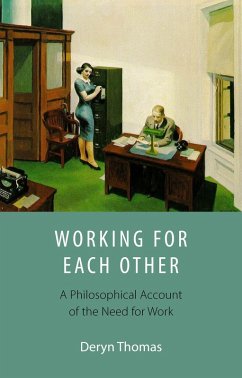The way we work is radically changing, due to advancements in technology, shifting work norms, changes to the landscape of labour policy, and unprecedented global events, like the Covid-19 pandemic. As the changes have played out with increasing speed and intensity, in public and in private spheres, many have questioned whether work is something we need to do at all. After all, much work has become bad. Many forms of it are physically dangerous, psychologically harmful, dehumanizing, unfulfilling, or just plain bullshit. Much of it is underpaid and unfairly compensated. Many toil for much of their lives in jobs they dislike with little or nothing to show for it. The anti-work view argues - persuasively so - that humanity would be better off in a world without work.
But while some forms of work can be very bad, there is much evidence to suggest that it can also be very good - perhaps even an essential component of people's happiness and well-being. A person's work can be the thing that gets them out of bed in the morning, fills them with a sense of purpose, and provides them with a social community, all while meeting their material and financial needs. Above all, work is a social activity: one that we do together with others, in response to their needs and our own, in the context of the institutions and structures that give shape to our social world.
Working For Each Other challenges the anti-work narrative by proposing an alternative view: that work is not an individual necessity, but a social one. As an individual, people have certain needs that allow them to live and thrive in the world: things like food, shelter and resources. In the same way, our communities and societies have requirements - like infrastructure and essential services - that they can't do without. Work is one of these fundamental collective needs: even if one does not work, someone else must. Recognising the role that work plays in how we communicate with each other about our contributions to our communities and societies can allow us to reimagine the promise of work to be part of a good life - in particular, a life shared with others.
But while some forms of work can be very bad, there is much evidence to suggest that it can also be very good - perhaps even an essential component of people's happiness and well-being. A person's work can be the thing that gets them out of bed in the morning, fills them with a sense of purpose, and provides them with a social community, all while meeting their material and financial needs. Above all, work is a social activity: one that we do together with others, in response to their needs and our own, in the context of the institutions and structures that give shape to our social world.
Working For Each Other challenges the anti-work narrative by proposing an alternative view: that work is not an individual necessity, but a social one. As an individual, people have certain needs that allow them to live and thrive in the world: things like food, shelter and resources. In the same way, our communities and societies have requirements - like infrastructure and essential services - that they can't do without. Work is one of these fundamental collective needs: even if one does not work, someone else must. Recognising the role that work plays in how we communicate with each other about our contributions to our communities and societies can allow us to reimagine the promise of work to be part of a good life - in particular, a life shared with others.
Dieser Download kann aus rechtlichen Gründen nur mit Rechnungsadresse in A, D ausgeliefert werden.









